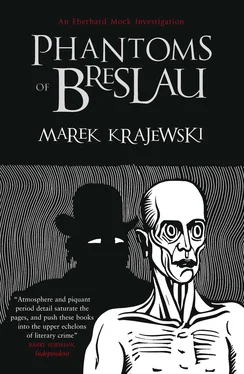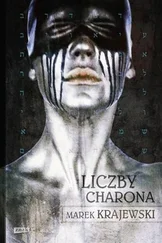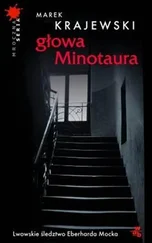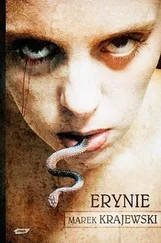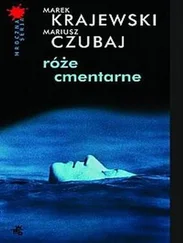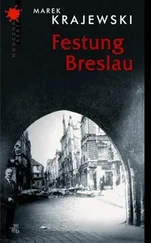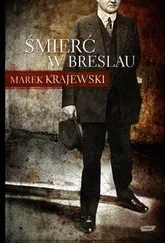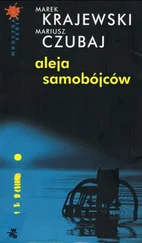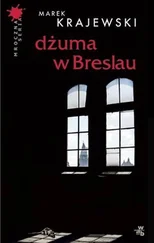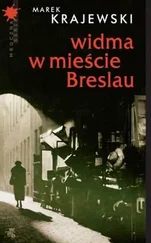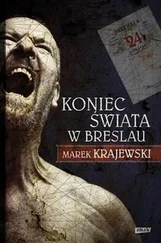Marek Krajewski - Phantoms of Breslau
Здесь есть возможность читать онлайн «Marek Krajewski - Phantoms of Breslau» весь текст электронной книги совершенно бесплатно (целиком полную версию без сокращений). В некоторых случаях можно слушать аудио, скачать через торрент в формате fb2 и присутствует краткое содержание. Жанр: Полицейский детектив, на английском языке. Описание произведения, (предисловие) а так же отзывы посетителей доступны на портале библиотеки ЛибКат.
- Название:Phantoms of Breslau
- Автор:
- Жанр:
- Год:неизвестен
- ISBN:нет данных
- Рейтинг книги:3 / 5. Голосов: 1
-
Избранное:Добавить в избранное
- Отзывы:
-
Ваша оценка:
- 60
- 1
- 2
- 3
- 4
- 5
Phantoms of Breslau: краткое содержание, описание и аннотация
Предлагаем к чтению аннотацию, описание, краткое содержание или предисловие (зависит от того, что написал сам автор книги «Phantoms of Breslau»). Если вы не нашли необходимую информацию о книге — напишите в комментариях, мы постараемся отыскать её.
Phantoms of Breslau — читать онлайн бесплатно полную книгу (весь текст) целиком
Ниже представлен текст книги, разбитый по страницам. Система сохранения места последней прочитанной страницы, позволяет с удобством читать онлайн бесплатно книгу «Phantoms of Breslau», без необходимости каждый раз заново искать на чём Вы остановились. Поставьте закладку, и сможете в любой момент перейти на страницу, на которой закончили чтение.
Интервал:
Закладка:
Mock had stopped thinking, stopped feeling anything. He took a few banknotes from his pocket.
“Could you ask somebody, Sister,” he whispered, and his bloodshot eyes flashed, “to clean my suit?” He collapsed onto the pillow and fell asleep.
Sister Hermina stroked his cheek, through which the pinpoints of a five o’clock shadow were beginning to protrude, and left the private room.
BRESLAU, THAT SAME SEPTEMBER 28TH, 1919
TEN O’CLOCK IN THE MORNING
Mock walked out of Wenzel-Hancke Hospital and stood deep in thought on the street corner next to a newspaper kiosk. Small children jostled past him in their Sunday best. Entire families hurrying to the evangelical church of St John the Baptist for morning Mass marched along the pavement. Industrious fathers strode by, their gastric juices dissolving fat Sunday sausages; next to them tripped mothers, flushed and sweating in the sun, chasing small herds of unruly children with their parasols. Mock smiled and stepped behind the kiosk to allow four young citizens to pass as they walked in a row holding hands, singing the miners’ song:
Gluck auf! Gluck auf!
Der Steiger kommt!
Und er hat sein helles Licht
Bei der Nacht
Schon angezundt.
A girl of about twelve wearing a pair of thick, darned stockings was making her way behind the children, carrying a bouquet of roses and pushing it under the noses of those standing at the hospital entrance.
Mock glanced down at his cleaned suit and his brogues; a thick layer of polish concealed the scuff marks. The sleeve of his jacket had been well repaired and he could tell from the exceptional softness of its felt that his bowler hat had been cleaned over steam. He beckoned to the girl. She ran to him with her bouquet of roses, apparently limping. Mock inspected the flowers critically.
“Take the flowers into the hospital, to the nurse who was on night duty.” He handed the girl ten marks and a small card printed with the words EBERHARD MOCK, POLICE PRAESIDIUM. “And attach my business card.”
The girl hobbled to the hospital and Mock was reminded of the cripple he had killed the previous day. He thought of Erika’s empty bed. His diaphragm heaved, and his gullet filled with burning bile. He felt faint and held on to the railings surrounding the hospital. Everything seemed to be at a slant. The elegant Neudorfstrasse grew distorted in yellow-black reflections. The mighty buildings with their elaborate decoration rolled and pressed down on one other. He rested his head against the railings and closed his eyes. His head was bursting, as if he had a hangover. The worst hangover was better than a bad conscience, than the invalid’s contorted legs thrashing against the floor and the empty bed where there was no longer even a trace of Erika’s scent. Mock wanted a hangover, wanted to suffer, anything so as not to hear the baying of the Erinyes. He looked up and saw the sun-drenched street in its proper perspective. Among the shop signs, one stood out: m. horn — colonial goods. Mock knew the owner and knew he could persuade him to sell him a bottle of liqueur, even on a day of rest.
He set off in the direction of the shop, but stopped at the kerb. The street was very busy. Carriages and cars carrying citizens to church wound their way towards the town centre; in the opposite direction strolled those intending to enjoy an autumnal walk in South Park. All of a sudden there was a commotion. A cab had almost hit a speeding motor with its shaft. The horse yanked at its harness and the cabby swore at the driver, aiming his whip at the elegant gentleman sitting in the open-topped car. Making the most of the confusion, Mock leaped into the street and ran towards the shop and its shelves of bottles filled with colourful sweetness.
But before he could reach them he was accosted outside the shop by a newspaper vendor.
“Special edition of the Breslauer Neueste Nachrichten !” yelled the boy in the cap. “Vampire of Breslau commits suicide!”
When Mock saw the article on the front page, he forgot all about alcohol:
VAMPIRE NO LONGER THREATENS CITIZENS OF BRESLAU
Last night, during a spiritual seance, the well-known Breslau doctor, Horst Rossdeutscher, committed suicide. Notes were found in the suicide’s house, a singular diary in which he admits to the cruel murder of four men, unidentified to this day, of Julius Wohsedt, director of the Wollheim river port, and of a young prostitute identified as Johanna Voigten. The diary claims that the murders committed during the first four days of September were of a ritualistic nature. According to the Chief of the Murder Commission of the Police Praesidium, Criminal Commissioner Heinrich Muhlhaus, Rossdeutscher had summoned the souls of those he had killed during spiritual seances and, using occult practices, had channeled them to harm an employee of the Vice Department. Neither Criminal Commissioner Muhlhaus nor the aforementioned employee himself, Criminal Assistant Eberhard Mock — we give his name here for the organ grinders of Breslau sing of him! — can explain why Rossdeutscher harboured such a burning hatred for Mock.
Yesterday at midnight, during a successful operation by the police under Criminal Commissioner Muhlhaus and the Mayor’s plenipotentiary, Doctor Richard Pyttlik, all those taking part in the seance were arrested. They were, according to the notes, members of a secret occult brotherhood that worshipped ancient Greek deities. Among those arrested were eminent representatives of learning, such as a prominent Hittite linguist at one of the oldest and most renowned German universities. They have been apprehended in order to investigate the matter, but there are unofficial reports that Rossdeutscher’s notes — which consist of obscure and garbled notions on mythological subjects — cannot form the basis of a charge.
An unfortunate incident occurred during the seance. Rossdeutscher’s handicapped and wheelchair-bound daughter, Louise (twenty), used by her father as a medium to enable the brotherhood to communicate with the dead, suffered a fatal accident as she fell from her wheelchair. On witnessing the death of his beloved daughter, Rossdeutscher shot himself.
The grisly investigation known by the police as the “Four Sailors” case has come to an end. Certain individuals allegedly at risk of death at the hands of the vampire, and for that reason held in isolation by the police, have now been released. The city breathes a sigh of relief. But one question arises: what is happening to our society when one of its foremost representatives, a well-respected surgeon, yields to superstitions which lead him to commit such monstrous crimes? It would be understandable for some eccentric aristocrat, or a shopkeeper tormented by rampaging inflation, to find solace in supernatural powers, but an enlightened representative of science? Sic transit Gloria mundi . †
At the bottom of the page there was a large photograph of a young woman with the caption “Erika Kiesewalter”, and beneath it the following text:
Twenty-three-year-old Erika Kiesewalter, actress and dance-hostess at the Eldorado Restaurant, disappeared on the night of 27th to 28th September. Dark-red hair, medium height, slim build. No distinguishing features. Anyone with information regarding the missing person is requested to contact the Police Praesidium. Information resulting in Erika Kiesewalter’s discovery will be rewarded with the sum of fifteen thousand marks.
BRESLAU, THAT SAME SEPTEMBER 28TH, 1919
ELEVEN O’CLOCK IN THE MORNING
Mock climbed to the first floor of the imposing, detached tenement near South Park and knocked energetically at the door to one of the apartments. It was opened by the owner himself, Doctor Cornelius Ruhtgard, who was wearing a crimson dressing gown with velvet lapels and embossed brown-leather slippers. From beneath the velvet lapels peeped the knot of a black necktie.
Читать дальшеИнтервал:
Закладка:
Похожие книги на «Phantoms of Breslau»
Представляем Вашему вниманию похожие книги на «Phantoms of Breslau» списком для выбора. Мы отобрали схожую по названию и смыслу литературу в надежде предоставить читателям больше вариантов отыскать новые, интересные, ещё непрочитанные произведения.
Обсуждение, отзывы о книге «Phantoms of Breslau» и просто собственные мнения читателей. Оставьте ваши комментарии, напишите, что Вы думаете о произведении, его смысле или главных героях. Укажите что конкретно понравилось, а что нет, и почему Вы так считаете.
